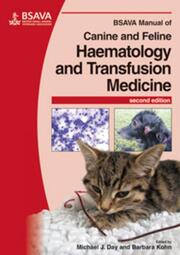-
Zusatztext
-
The first edition of the BSAVA Manual of Canine and Feline Haematology and Transfusion Medicine was a leader in its field, and this new edition has been eagerly awaited. The basic principles of haematology, which form the core of the Manual, have been updated to include new diagnostic procedures and new treatment strategies. New authors provide a fresh perspective on some topics and there are new chapters on anaemia of inflammation and neoplasia, non-regenerative anaemia, and vascular thrombosis. Arthropodtransmitted infectious diseases of companion animals are increasingly significant, reflected in updated chapters on leishmaniosis, babesiosis, monocytic ehrlichiosis and anaplasmosis, where haematological analysis is part of the first line of diagnosis. Another area in which there have been significant advances since the first edition is feline haemoplasmosis, and a completely revised chapter provides the latest information on these infectious agents. The section on transfusion medicine has been reorganized and expanded, with stand-alone chapters on canine and feline blood groups and transfusion. A new chapter considers the use of blood substitutes.
-
-
Kurztext
-
The first edition of the BSAVA Manual of Canine and Feline Haematology and Transfusion Medicine was a leader in its field, and this new edition has been eagerly awaited. The basic principles of haematology, which form the core of the Manual, have been updated to include new diagnostic procedures and new treatment strategies. New authors provide a fresh perspective on some topics and there are new chapters on anaemia of inflammation and neoplasia, non-regenerative anaemia, and vascular thrombosis. Arthropodtransmitted infectious diseases of companion animals are increasingly significant, reflected in updated chapters on leishmaniosis, babesiosis, monocytic ehrlichiosis and anaplasmosis, where haematological analysis is part of the first line of diagnosis. Another area in which there have been significant advances since the first edition is feline haemoplasmosis, and a completely revised chapter provides the latest information on these infectious agents. The section on transfusion medicine has been reorganized and expanded, with stand-alone chapters on canine and feline blood groups and transfusion. A new chapter considers the use of blood substitutes. The author panel is comprised of internationally recognized specialists from Europe, North America, the Middle-East and Australia. These have worked together with the Editors to produce an essential book for the veterinary practice.
-
-
Autorenportrait
- Michael J. Day BSc BVMS(Hons) PhD DSc DipECVP FASM FRCPath FRCVS Michael qualified as a veterinary surgeon from Murdoch University (Western Australia) in 1982. After a period in small animal practice he returned to Murdoch to complete a Residency in microbiology and immunology, and a PhD involving collaborative research with the Royal Perth Hospital. Michael has held postdoctoral positions in experimental immunology at the Universities of Bristol and Oxford and is currently Professor of Veterinary Pathology and Director of Diagnostic Pathology at Bristol. His research interests cover experimental models of autoimmunity and a range of companion animal immune-mediated and infectious diseases. Michael has published widely in the field of immunopathology and is currently Editor-in-Chief of the Journal of Comparative Pathology. Barbara Kohn Dr.med.vet. DipECVIM-CA Barbara graduated from LM-University Munich; her doctoral thesis is in veterinary physiology. She worked as an assistant in private small animal clinics and as a resident in small animal internal medicine at the University of Zurich. At the University of Pennsylvania she did a postdoctoral research fellowship in transfusion medicine and haematology. Since 1996 Barbara has worked at the Freie Universität Berlin, as a senior lecturer, assistant professor and, since 2003, as Professor of Small Animal Internal Medicine. Her main areas of research interest include haematology, transfusion medicine, clinical immunology, infectious diseases and gastroenterology. Barbara is co-editor of a standard textbook on canine diseases and currently Editor of the journal Kleintierpraxis.
Detailansicht
BSAVA Manual of Canine and Feline Haematology and Transfusion Medicine
BSAVA - British Small Animal Veterinary Association
ISBN/EAN: 9781905319299
Umbreit-Nr.: 1524537
Sprache:
Englisch
Umfang: XI, 336 S.
Format in cm: 1.7 x 29.7 x 21
Einband:
kartoniertes Buch
Erschienen am 16.03.2012
Auflage: 2/2012


